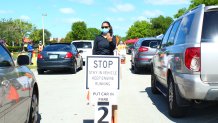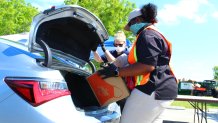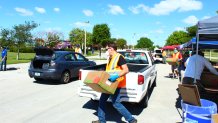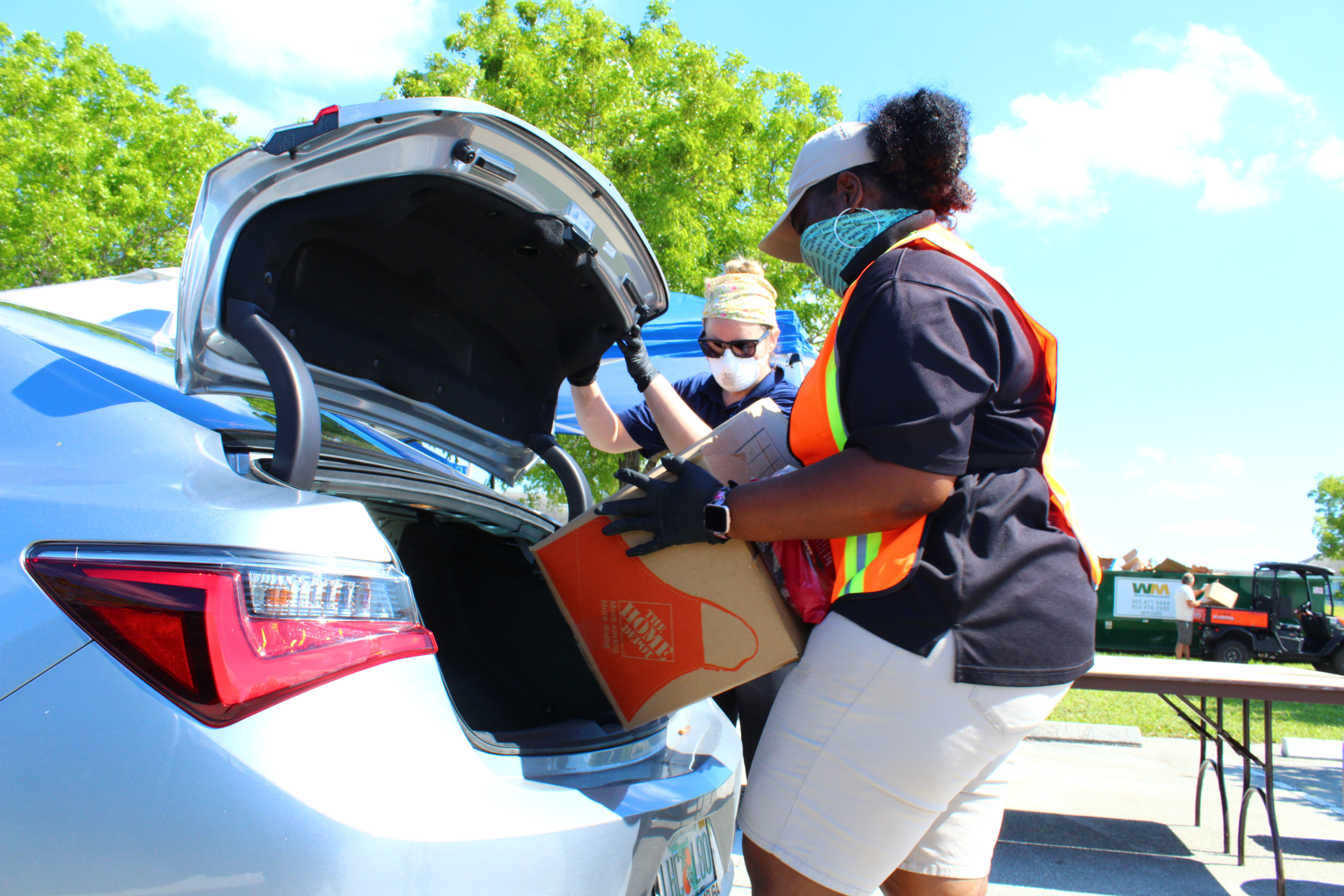The images are overwhelming.
Long lines of vehicles across the country. People patiently waiting for free food because buying groceries is becoming harder or impossible.


The demand on food pantries and organizations that help the hungry is growing in South Florida. Local governments, churches, community leaders and ordinary people are pitching in to help with the many food distribution sites we are seeing each day.
The families inside the vehicles have stories of struggle, stories of newfound financial hardship, stories of already making it with little and now facing next to nothing in the bank.
This week, NBC 6 is taking a look at those rolling up their sleeves to help and at the families who are dealing with the economic toll of COVID-19 at their kitchen tables.

Part I: The Williams Family
Shifting through what’s available at food pantries, waiting in long lines at food distribution sites, looking for free sources of food during the pandemic -- it’s an example of a mother’s love in its purest form.
Monique Williams has two small children. She and her husband, Walter Williams, both work for Broward County schools. She’s a teacher’s assistant, and he works in maintenance. They are still getting paid but they are not going in right now because schools are closed due to the pandemic.
The extra time at home with their 6-year-old son and 11-month-old daughter has put pressure on their budget. Their grocery bill is at an all-time high.
“We are not used to spending that much weekly on food,” Monique Williams said.
Beyond the grocery expenses, their utility bills are up because they are home more.
Their situation is an example of the economic backlash of COVID-19. With no end to the pandemic in sight, the free food sources are a relief.
“It’s a big help for our family. We don’t have to take the money for bills and put it toward groceries,” Monique said.
Even though they still have a household income, the family has had to dip into their savings. Monique worries about the future and the potential for job loss in this economic climate.
“You never know,” she said.
Families who were living paycheck to paycheck are facing newfound hardship all across America. Top that off with anxiety toward an unknown future. For Williams, it’s enough to put her pride aside.
“I’m taking what my family needs at the moment,” she said.
<< Click here for a full list of food distribution sites in South Florida >>
Part II: The Carrivain Family
The financial impact of the pandemic is hitting single mother Sabrina Carrivain hard.
“At the beginning, I was scared of the illness without thinking about how we are going to make it, “ she said.
Over the last few years, "making it" has proved harder and harder. Three years ago, her son Evan was born. Soon she learned she would be a single mother.
“As a single mom you pay a lot of things, everything is expensive," she said.
Those expenses are impossible to keep up with now because she hasn’t worked since March. She’s a professional hairdresser, considered a non-essential worker during this pandemic.
“The stress is a lot," she said.
Her son’s father is not in his life. Her extended family is in France. She is raising her son completely alone in Miami. She says her money has run out. Food distribution sites are now part of her daily routine. Those sources are helping her keep her son fed.
“There is no more cash at home,” she said.
Food Distributions in South Florida
Part III: The Bravo Family
The financial toll of the coronavirus is hitting low-income families the hardest. These are the people who were already strapped before the pandemic. Job loss, reduced household incomes and other financial hits related to the pandemic have left them with nothing because they had nothing to fall back on.
This is true for the Bravo family. The free food distributed biweekly by Miami-Dade public schools is a help, but it is not enough.
They are two months behind on the rent, and that’s not all.
“Behind the rent, behind the light, behind the water,” said Freddy Bravo.
He and his wife Penny Bravo know all about making it with very little. He delivers food, but right now, work is hard to come by. She cleans homes from time to time, but right now her efforts are needed at home.
“I can’t work now because I watch my grandchildren and my kids. The school's closed,” she said.
They have a large family. Ten children, three of them under 18, and 13 grandchildren. Their adults kids are barely making it. They have nowhere to turn.
The health threat of COVID-19 is barely a concern because they are concerned with having enough for their family to eat.
Part IV: The Helping Hands
It takes many to feed the growing need for free food in South Florida. The list of families in newfound financial hardship is growing.
These are people who could once afford groceries but now are finding it difficult or impossible to feed their families. They are spending hours each week in the many food distribution lines.
“We’re trying to make sure that folks don’t go hungry,” said Florida Sen. José Javier Rodríguez. He talked to NBC 6 as he rolled up his sleeves and pitched in at a food distribution site in South Florida.
From elected officials to volunteers, there are many hands on deck. The food comes from donations and from organizations that feed the hungry like Farm Share.
“Our food comes from donations from local farmers, big box stores and the bulk of the food that we have come from the USDA," said Farm Share Community Food Distribution Coordinator Luis Dickson.
Across South Florida, those who are dealing with all of this daily say the need is growing. The financial impact of COVID-19 is affecting people from almost every demographic.
Part V: The Izulbaran Family
Every Tuesday, Silvia Caridad Izulbaran opens her door to find David Garcia. It’s become a part of her routine.
Garcia works for the office of Miami Commissioner Manolo Reyes. His job title of Community Liaison took on a whole new meaning in response to the pandemic. He delivers food to families who need it.
“I already told him I won’t accept anything if it’s not from them,” Izulbaran said.
The 83-year-old woman is a long-time widow. She never had children, but she has a responsibility. Her 45-year-old niece, who has a disability, is her dependent. She says she needs to stay healthy for her.
Izulbaran would be putting her life at risk if she walked into a grocery store. She has a nephew who helps sometimes, but the food deliveries from the commissioner's office keep the flow of food in her home. Her fixed income can’t accommodate grocery food delivery charges.
“I’m just doing what I have to do," Reyes said.
He knows the needs in his community. Much of the population is elderly and low-income. That understanding gave him the foresight to be ahead of the food need. He was one of the first in Miami to host a food distribution. The home deliveries are part of his massive effort to meet the needs of those he serves.
Part VI: Undocumented Immigrants Struggle to Get Food
The financial toll of the pandemic hits harder when even help seems hard to come by. For undocumented immigrants who were working cash jobs before the pandemic, things are tough.
NBC 6 interviewed a woman from Honduras, who is a wife and a mother of four children. She says her family is struggling for food.
Karen carries worry every minute of every day.
"I’m not thinking of the sickness. I’m thinking of feeding my children,” she said.
Before the pandemic, Karen was cleaning homes for cash, and her husband was bringing in money from construction jobs. He’s managed to keep working, but his hours have been reduced.
She, like other domestic workers, hasn’t seen an income in a while. Money is very tight.
The family is trying to make it on less than $2,000 dollars a month. Karen goes to food distribution sites for free food, but most of them are drive-thru only so she gets turned away. The situation is frustrating. She prays this will all be over soon.
Part VII: 10-Year-Old Shares Food Struggle Amid Pandemic
She knows that she can’t expect the fridge to be full, and that snack time isn’t want it used to be.
“What we most like are snacks, like all kids," a 10-year-old girl told NBC 6, with the raw innocence of a child but with the profound understanding of someone who is experiencing a tough time in life. "I just want this to end. I want us to be happy again like we used to be.”
The child is processing the food struggle brought on by the financial toll of the coronavirus pandemic. Her parents gave NBC 6 permission to interview her.
“We are not actually poor, but we are struggling a lot right now,” she said.
That struggle is something we are seeing across the country and across South Florida. The girl’s family lines up at distribution sites alongside the many others looking for free food sources.
When you don’t have money for food, you don’t have money for much else.
“Like right now, I want new shoes, but my mom doesn’t have money to buy me, my shoes are dirty and old," she said.
Part VIII: Viewers Give Back to Community in Need
It’s the kind of joy that all kids deserve – and it came during a visit from a young NBC 6 viewer.
16-year-old Steven Ferriero saw a 10-yearold featured during our weekly Helping Hands series, where the youngster told us about her family’s financial struggles during the coronavirus pandemic. After seeing it, Ferriero showed up in a big way to donate help for the family.
Remember Sabrina Carrivain? She’s able to make a living once again after the single mother was deemed a non-essential worker during the pandemic and went more than two months without a paycheck and having to turn to free food distributions across South Florida to feed her son.
“People I don’t know reached out on Facebook and helped me out,” she said.
Among those who decided to help out was a local businessman who handed over a check for $1,000.
“I still can’t believe it,” Carrivain said.
When we introduced you to Penny and Freddy Bravo, they were under extreme stress and opened up about their financial struggles. After the story aired, the baseball team that Freddy coaches stepped up with donations for their leader.
“When I saw all the cars coming, it was beautiful,” said Freddy.
“It gave me hope and made me stronger,” Penny added. “It made me feel like I don’t need to be ashamed to ask for help when you need help.”
Talking about financial struggles isn’t easy. For Karen, an undocumented immigrant from Honduras, it was a scary thing to do after we featured her family’s struggle for food - and our viewers reacted in a big way to help.
“There’s power in social media,” said Erica Davis, one of the many who helped. “I posted and said I want to get this family fed and many people wanted to help.”
We named our series Helping Hands because it includes the actions of organizations and community leaders, like those hosting food distributions that include making home deliveries.
From elected officials to the people featured to those who have turned into helpers, the feedback drives us to keep telling these stories.
Part IX: The Demand for Baby Food and Formula in Pandemic
Four-month-old Kingreese is the youngest of nine siblings, and his mother is struggling with keeping his tummy full.
“The formula costs a lot of money,” says Monique Huggens.
Like every parent she wants her children to have everything they need, and her current situation is stressful.
She was doing hair before the pandemic but with an infant and other young children she doesn’t want to take the risk.
“With me having multiple kids, you know if one of them gets sick then everybody gets sick because all of us are in the same household," she says.
She is the only parent in the house. “Some days, I don’t know how I will make it from one day to the next,” she says.
The Miami Diaper Bank is a resource for Huggins, providing free formula, baby food and diapers for her household.
The non-profit traditionally focuses on diaper needs, but so many families have expressed needs for formula and baby food during this pandemic that now the organization is focusing on overall baby needs.
For more information, click on this link.
Part X: Single Mother Gets Needed Help in Pandemic
When you’re living paycheck to paycheck any little thing can throw your budget out of whack. That’s what happened to single mother, Ashlen Hicks.
"I had to stay home for a week without pay,” she says.
Her youngest child, 2-year-old Aubrey got sick between late March and early April. Of course, the mother of four was worried because of the threat of COVID-19.
The toddler ended up recovering fairly quickly from what turned out to be the flu. Hicks says her budget was affected much worse.
"It’s very stressful,” she says.
She turned to Jack and Jill Children’s Center for help. The organization has been operating in Broward County for more than 70 years. It has a long history of helping low-income families with resources and education.
During this pandemic, the organization’s CEO is seeing a lot of families affected financally.
“Our families that we serve are very resilient. We are proud of what they do to make ends meat , and they are living pay check to pay check. Then, you throw in COVID, many lost their jobs, temporarily lost their jobs or hours were cut back. They were at our door saying 'can you help me in some way?' And of course, we can, ” says CEO Heather Siskind.
The center has a food pantry where families can go. That pantry is helping Hicks keep food on the table. There are so many families in need that the shelves are constantly scarce. If you want to help with a donation, visit the website by clicking on this link.
Part XI: Helping the Homeless Struggling in Pandemic
He was working in retail just a few months ago and now he’s living in the streets of downtown Miami. A man who asked us not to show his face or share his name agreed to use his voice to share a reality of the financial toll of the pandemic.
“I actually left my apartment because I was afraid that I wasn’t going to be able to pay the rent and get evicted and have that ruin my credit,” he said.
When he was initially laid off, he never imaged that he would end up homeless.
“You don’t think about it at first,” he said.
Now, he’s not only homeless but also hungry.
“When your stomach is touching your back, it’s hard,” he said.
A recent unemployment analysis from Columbia University projects a potential 45 percent increase in unemployment. Here in South Florida, there is a concern about rising numbers.
The Downtown Development Authority works to help the homeless in Miami, the executive director, Christina Crespi says the reality of the pandemic is problematic.
"I do think we will see an increase with the numbers,” she says.
Juan Portela is also with the Downtown Development Authority but he works on the streets with the homeless. He understands them because he too was homeless a few years back.
“I see a lot of new faces,” says Portela.
He knows the homeless community but the new faces are people who have just recently ended up on the street. The relationship between hunger and newfound homelessness is painfully close according to Portela.
Part XII: Food Bank Easing Insecurity in Pandemic
With families across South Florida struggling to put food on the table during the coronavirus pandemic, one group is hoping to help ease the strain on those in need during this trying time.
Bridge to Hope has been helping low-income families with various needs for a long time. During this pandemic, the organization is seeing a huge demand on its food pantry.
“The demand has gone up over 500 percent,” said executive director and co-founder Vanessa Tinsley.
She knows the people who come for help very well, and she knows their struggles with putting food on the table. She personally understands the complexity of food insecurity because she went through it years ago.
“I was a single mom suddenly,” she says.
Financial uncertainty can be “terrifying,” Tinsley says.
Volunteers help things flow at Bridge to Hope, and so do community partnerships and donations. The people who need the help are grateful, but also a bit worried it might end.
Their voices help us understand the food struggle better, a problem we’ve been covering each week for months now in our Helping Hands series. To help donate, click on this link for more information.

